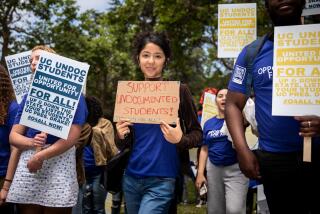Federal suit planned against UC over ban on affirmative action
Seeking to increase the ranks of black, Latino and Native American students at the University of California, civil rights activists said they will file a federal lawsuit Tuesday challenging the state law that bans affirmative action in admissions.
The suit contends that Proposition 209, which was passed by California voters in 1996, violates equal protections guaranteed by the U.S. Constitution and says it has limited the numbers of non-Asian minority students at UC’s most selective campuses. The suit also criticizes the university system for relying too heavily on high school grades and test scores in admissions, saying that the practice discriminates against students from schools without strong honors classes and counseling.
“Proposition 209 has created a racial caste system in which the state’s most prestigious schools train mostly white students and students from some Asian backgrounds,” said the suit, which names Gov. Arnold Schwarzenegger and UC President Mark G. Yudof as defendants. It is expected to be filed in U.S. District Court in San Francisco and is being brought on behalf of California students by the Coalition to Defend Affirmative Action, Integration, and Immigrant Rights and Fight for Equality By Any Means Necessary, known as BAMN.
In 1997, the U.S. Supreme Court rejected a challenge to Proposition 209, despite an appeal that government should use racial preferences to make up for past bias.
George Washington, a Detroit-based attorney for the group, said the legal environment has changed enough in recent years that his case can succeed. He cited the U.S. Supreme Court’s 2003 decision in a case involving the University of Michigan’s law school, which allowed colleges to consider race as a factor in admissions as long as they do not use quotas.
UC spokesman Steve Montiel said the university cannot ignore Proposition 209. “If this [suit] opens up another discussion, that’s well and good, but as long as Proposition 209 is the law, we’re obliged to follow it,” he said.
Within those limits, UC is doing as much as it can through financial aid and other efforts “to ensure the widest possible access,” he said.
More to Read
Sign up for Essential California
The most important California stories and recommendations in your inbox every morning.
You may occasionally receive promotional content from the Los Angeles Times.










